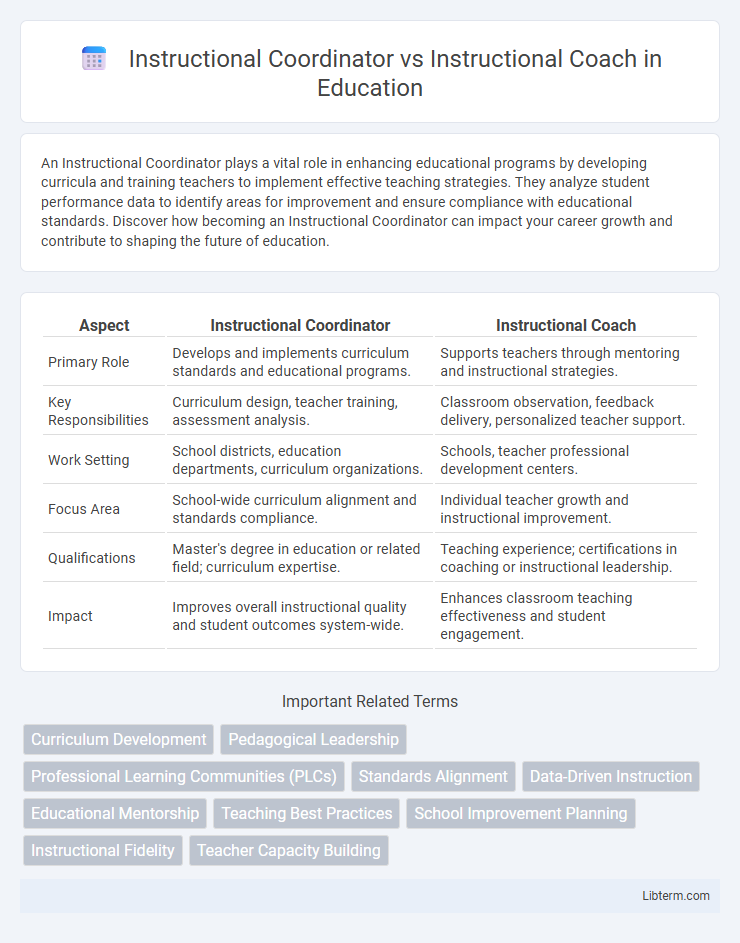An Instructional Coordinator plays a vital role in enhancing educational programs by developing curricula and training teachers to implement effective teaching strategies. They analyze student performance data to identify areas for improvement and ensure compliance with educational standards. Discover how becoming an Instructional Coordinator can impact your career growth and contribute to shaping the future of education.
Table of Comparison
| Aspect | Instructional Coordinator | Instructional Coach |
|---|---|---|
| Primary Role | Develops and implements curriculum standards and educational programs. | Supports teachers through mentoring and instructional strategies. |
| Key Responsibilities | Curriculum design, teacher training, assessment analysis. | Classroom observation, feedback delivery, personalized teacher support. |
| Work Setting | School districts, education departments, curriculum organizations. | Schools, teacher professional development centers. |
| Focus Area | School-wide curriculum alignment and standards compliance. | Individual teacher growth and instructional improvement. |
| Qualifications | Master's degree in education or related field; curriculum expertise. | Teaching experience; certifications in coaching or instructional leadership. |
| Impact | Improves overall instructional quality and student outcomes system-wide. | Enhances classroom teaching effectiveness and student engagement. |
Introduction to Instructional Roles
Instructional coordinators develop curriculum standards, design instructional materials, and ensure compliance with educational policies to enhance overall teaching effectiveness. Instructional coaches focus on supporting teachers through personalized guidance, classroom observations, and professional development aimed at improving instructional practices. Both roles play critical parts in educational systems, with coordinators shaping curriculum frameworks and coaches driving teacher growth.
Defining the Instructional Coordinator
An Instructional Coordinator develops curriculum standards, analyzes student performance data, and implements educational policies to improve teaching effectiveness across schools or districts. They focus on aligning instructional materials with state guidelines and provide professional development for educators to enhance curriculum delivery. Their role emphasizes administrative oversight and systemic educational improvement rather than direct classroom coaching.
Role and Responsibilities of an Instructional Coach
Instructional coaches primarily focus on supporting teachers through personalized professional development, classroom observations, and feedback to improve instructional practices and student outcomes. They collaborate with educators to implement curriculum strategies, integrate technology, and analyze assessment data to tailor interventions. Unlike instructional coordinators who manage curriculum development and compliance, instructional coaches emphasize hands-on mentoring and fostering teacher growth at the classroom level.
Key Differences Between Coordinator and Coach
Instructional Coordinators primarily manage curriculum standards, analyze student data, and develop instructional materials aligned with state and federal regulations, while Instructional Coaches focus on providing hands-on support, mentoring teachers, and refining classroom techniques through personalized feedback. Coordinators often work with administrators to implement educational policies and training programs at a systemic level, whereas Coaches operate directly in classrooms to enhance teaching strategies and student engagement. The key difference lies in Coordinators' emphasis on curriculum management and compliance, contrasted with Coaches' role in practical, day-to-day instructional improvement.
Educational Requirements and Certifications
Instructional Coordinators typically require a master's degree in education, instructional design, or curriculum development, with certifications such as a teaching license or specific curriculum specialist credentials often preferred. Instructional Coaches usually hold a valid teaching certification and a bachelor's or master's degree in education, with additional endorsements or certifications in coaching, professional development, or instructional strategies enhancing their qualifications. Both roles emphasize expertise in pedagogical methods, though Instructional Coordinators may need advanced credentials related to educational leadership or administration.
Impact on Teaching Effectiveness
Instructional Coordinators analyze curriculum data and implement standards, driving systemic improvements that enhance overall teaching quality. Instructional Coaches provide personalized support and feedback to teachers, directly influencing classroom practices and boosting individual teaching effectiveness. Both roles are essential but differ in scope, with Coordinators shaping broader educational strategies and Coaches refining day-to-day instructional skills.
Collaboration with Teachers and Staff
Instructional Coordinators analyze curriculum effectiveness and collaborate with teachers to develop instructional materials aligned with educational standards. Instructional Coaches work directly with teachers, providing personalized support and modeling teaching strategies to improve classroom practices. Both roles foster professional development through ongoing collaboration, but Instructional Coaches emphasize hands-on mentorship while Coordinators focus on systemic curriculum enhancement.
Career Pathways and Advancement
Instructional Coordinators typically advance by moving into district-level leadership or curriculum director roles, leveraging their expertise in curriculum development and assessment standards. Instructional Coaches often progress into instructional leadership or teacher training positions, focusing on classroom strategies and professional development. Both career pathways emphasize deepening educational expertise but diverge as coordinators prioritize systemic curriculum oversight while coaches specialize in direct teacher support and instructional improvement.
Challenges Faced in Each Role
Instructional coordinators face challenges such as aligning curriculum standards with diverse student needs and managing administrative tasks that limit direct classroom involvement. Instructional coaches encounter difficulties in building trust with teachers resistant to change and tailoring support to varied teaching styles within limited time frames. Both roles require balancing educational goals with practical constraints while fostering collaboration among educators.
Choosing Between Instructional Coordinator and Instructional Coach
Choosing between an Instructional Coordinator and an Instructional Coach depends on the organization's goals for educational improvement and staff development. Instructional Coordinators typically oversee curriculum standards, implement instructional policies, and analyze educational data to enhance school-wide teaching strategies. In contrast, Instructional Coaches work directly with teachers to model lessons, provide personalized feedback, and foster professional growth in classroom practices.
Instructional Coordinator Infographic

 libterm.com
libterm.com